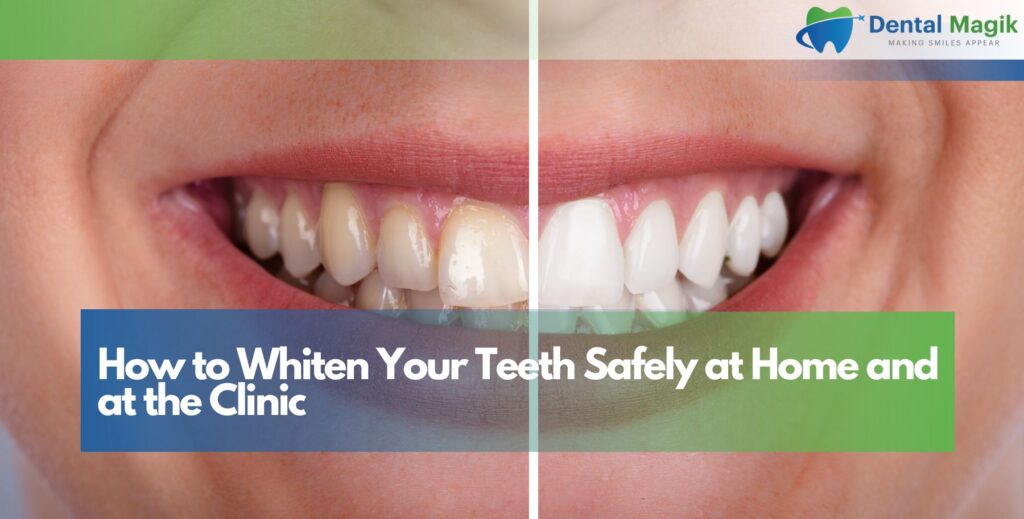Having a bright, white smile can boost your confidence. But with so many whitening options available today, it’s important to know what works—and what’s safe. Whether you’re thinking about doing it yourself at home or visiting a professional, here’s a complete guide to safe teeth whitening.
Why Do Teeth Get Discolored?
Teeth naturally darken over time. Stains build up from foods, drinks like coffee or red wine, and habits such as smoking. Sometimes, discoloration is internal, caused by medications, trauma, or aging. Understanding the cause helps you choose the most effective whitening method.
Types of Tooth Stains
There are two kinds:
- Extrinsic stains: On the surface from food, drinks, or tobacco.
- Intrinsic stains: Inside the tooth, often harder to treat without professional help.
Safe At-Home Teeth Whitening Options
Whitening your teeth at home is convenient and affordable. But not all methods are equally effective or safe. Here are the most reliable at-home solutions that work without damaging your enamel or gums.
Whitening Toothpaste
These contain mild abrasives and polishing agents. They remove surface stains but won’t drastically whiten teeth. Still, they’re safe for daily use and help maintain a white smile after other treatments.
Whitening Strips
Available over the counter, these contain low-concentration peroxide gels. They’re placed on your teeth for about 30 minutes daily for two weeks. They can lighten teeth by a few shades, but uneven results and gum sensitivity are common side effects.
Whitening Gels with Custom Trays
These are more advanced kits often provided by dentists. You wear the trays filled with gel for a set time each day. They offer better results than strips and are generally safe when used correctly.
Natural Remedies (Use With Caution)
Some people try baking soda or activated charcoal, but these can be too abrasive. Others use oil pulling or fruit peels, which lack scientific support. Always talk to a dentist before using natural whitening hacks.
Professional Teeth Whitening at the Clinic
For faster, long-lasting results, a visit to the dentist is the safest and most effective option. Professional whitening uses higher-concentration whitening agents under controlled conditions, making it safer for your teeth and gums.
In-Office Whitening Treatments
These are usually done in one visit and can lighten teeth by several shades. Your gums are protected, and a powerful whitening gel is applied to your teeth. Sometimes a special light or laser is used to boost results.
Custom Whitening Trays for Home Use
Dentists may also offer custom-fit trays and a higher-strength gel for you to use at home. This combines the safety of professional supervision with the convenience of at-home treatment.
Risks of Whitening Without Guidance
Not all whitening methods are safe—especially if used too often or incorrectly.
Tooth Sensitivity
Whitening agents can temporarily make your teeth more sensitive, especially if you already have gum recession or enamel loss.
Gum Irritation
Improper use of strips or gels can cause chemical burns or irritation on your gums.
Over-Whitening
Excessive whitening can erode enamel, causing permanent damage. Your teeth may also look translucent or uneven.
Tips for Safe Teeth Whitening
Follow these basic tips whether you’re whitening at home or at the dentist.
Consult Your Dentist First
Always check with your dentist before starting any whitening routine, especially if you have fillings, crowns, or sensitive teeth.
Follow Instructions Exactly
Don’t leave whitening products on longer than directed. Using more doesn’t mean better results—it just increases the risk.
Maintain Good Oral Hygiene
Brushing twice daily and flossing keeps your teeth clean and helps maintain results.
Avoid Staining Foods
Right after whitening, your teeth are more porous. Skip coffee, red wine, and tobacco for at least 48 hours.
How Long Does Whitening Last?
Results vary depending on your habits. Professional whitening can last up to 12–18 months, while at-home methods may last a few months. Regular touch-ups and a clean diet help maintain your results.
Is Whitening Right for Everyone?
Not everyone is a candidate. Pregnant or nursing women, children under 16, and people with allergies to whitening agents should avoid it. Also, restorations like crowns or veneers won’t respond to whitening and may need replacement for a color match.
Conclusion
You don’t need to sacrifice dental health to achieve a whiter smile. Whether you choose at-home methods or professional teeth whitening, safety should always come first. Consult a Dentist in East Brunswick, NJ to create a personalized whitening plan that works for you and protects your smile for years to come.
FAQs
How quickly does teeth whitening work?
In-office whitening shows results within one session. At-home kits take about 1–2 weeks.
Is teeth whitening permanent?
No. It lasts several months to a year, depending on your habits and the method used.
Can whitening damage enamel?
If done correctly, no. But overuse or misuse of products can weaken enamel and irritate gums.
Can I whiten my teeth if I have fillings or crowns?
Whitening only works on natural teeth. Fillings or crowns may need to be replaced to match the new shade.
How much does professional whitening cost?
It varies but typically ranges from $300 to $700, depending on the dentist and method used.







